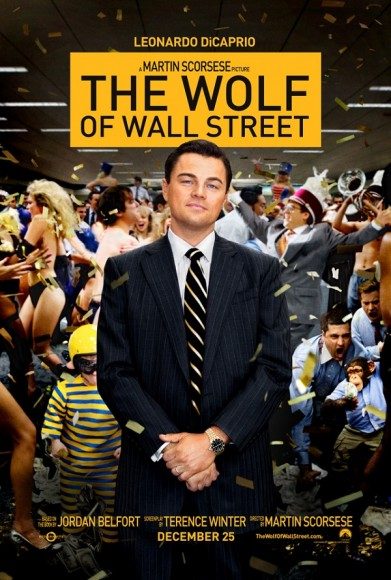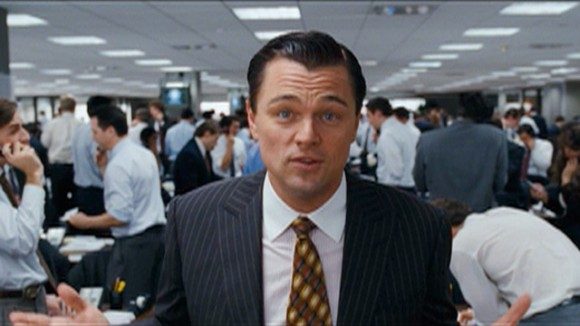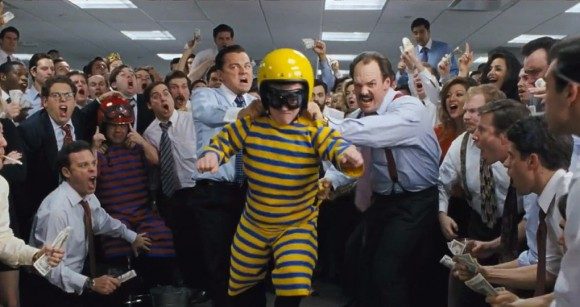The Wolf of Wall Street is crazy. No, I mean it’s one of those fact-stranger-than-fiction stories, because this sounds an awful lot like fiction: Money obsessed college grad moves to Wall Street, opens what rapidly becomes one of the most successful small firms in the stocks game, and cleans house primarily because of its founder’s ability as a salesman. Well, that, and said founder’s dangerously low scruples when it comes to selling lousy stock with a straight face. But this is, believe it or not, based on a true story, the memoir of the central figure in massively funny and at times rather disturbing tale.
This is a story about excess. It’s about the greed, sure, but for most of the picture neither Jordan Belfort (the aforementioned central figure, played by Leonardo DiCaprio) nor his closest associates (like Donnie Azoff, played by Jonah Hill) seem to have any trouble making as much money as they could possibly ever know what to do with. So it’s a movie about what they do with all their money. And what they do, we soon learn from Belfort’s voiceover, the parade of naked women, and mountains of pills and white powder, is mainline narcotics and screw more prostitutes than you thought could possibly live in New York. Between the nudity and Scarface-eclipsing quantity of drugs, not to mention the incessant stream of profanities (although this is given an explanation so clever it almost disappears as a comic stripe on the backdrop), it’s an open question as to why this still didn’t receive an NC-17 rather than an R.
The plot, again, concerns Belfort, a newlywed, newly graduated, ambitious young stock trader who, after a little time getting kicked around in the minor leagues, opens his own stock trading firm with some old friends of questionable intelligence and moral character. You may have seen in the trailer for this film how the desks quickly fill up his warehouse before transitioning to a massive office floor. That’s pretty well how the movie handles his expansion as well. From there, all the action is concerned with the antics of what Belfort and co. do with their slightly illicit funds before an extremely slow playing arc with an FBI investigator (played by Kyle Chandler) takes the forefront in the final third of the movie.
Oh, and that final third lasts an hour.
After director Martin Scorsese apparently had to re-cut the film because it was running far too long, it’s still clocking in at three hours, flat. But perhaps the oddest part of it, and one of my biggest criticisms of the film, is that you can feel how tough these cuts were to make as you’re watching the movie. It’s painfully obvious that they were pulling out seconds in some places to chisel down the runtime, and it leads to some technical hiccups that you’d never expect from someone as accomplished as Scorsese. Shots come in at odd angles, pacing seems enforced by the editors, not by the actors, and it’s clear that whole portions of several scenes were omitted and the scene stitched back together line by line to ensure it still made sense. There’s a certain amount of artistry lacking simply (and ironically, given the subject matter) because it seems the filmmakers had a bottom line they had to hit.
And that’s too bad, because although I wouldn’t want a four hour version of this movie (a further forty minutes could probably have been cut without doing real harm to the story being told), The Wolf of Wall Street feels like Scorsese kicking back and saying, “Let’s have some fun,” with his favorite actor (this is Scorsese’s fifth collaboration with DiCaprio). Scene after scene, or in some cases what’s left of them, the movie luxuriates in the interactions of its characters. There’s a scene early on where the wet behind the ears Belfort has lunch with Mark Hanna (Matthew McConaughey), a senior partner at the firm where he’s working at the time. It’s uproarious. Later, Belfort’s in a meeting with some of his inner circle and they’re discussing how they must behave around the midgets they’re hiring as human lawn darts an bowling balls for an upcoming office party. They’re talking about them as though they’re inhuman, livestock even, though perhaps possessed of alien powers. It’s tremendously offensive, but also fantastically entertaining. I can’t think of a single such scene I’d want cut, they’re so magnificently acted (DiCaprio and Hill carry this movie, and kudos to Terrence Winter for what appears to be a very well-written script), but it’s also true that there are a lot of scenes that, had I not known they existed, I’d have been perfectly happy without.
That’s the real cherry on top of this whole thing: in a film about excess, perhaps the biggest shortcoming is that the director got caught up in that same excess. It fits to a point, putting the audience in Belfort’s state of mind, but we’re nearly swept away by it. By the end of the movie, we’re numb to the whole thing. The constant stream of sex and nudity numbs us to what should be a more powerful scene between Belfort and his wife (Margot Robbie) near the end of the movie. The constant stream of drugs Belfort’s addicted to numbs him to all but the need to get high (“I am not going to die sober!” he screams at one point), and he has fun doing it. But most of all, it seems that Scorsese has little to offer to the discussion. The condemnation of Belfort for his many crimes is limited, at best. Scorsese luxuriates in the excess of his movie nearly as much as Belfort does in the excesses his money brings. The implicit comment for both is yes, sometimes you have to take your lumps, but you got what you wanted and you’ll get right back out and get it some more.
The Verdict: 4 out of 5
This is still a Martin Scorsese movie starring Leonardo DiCaprio, and it’s still very good. There may be more overt comedies that The Wolf of Wall Street, but there are few I’ve laughed more at. This is an incredibly funny, well acted movie. Each scene is brilliant, and it’s only when trying to corral them all into something not only narratively cohesive, but socially meaningful, that there begins to show the strain of cutting a movie that clearly knew no constraints while being shot. This is a fun but mostly empty ride that does more to assault the senses than find meaning in a fairly mind-boggling story of excess.




